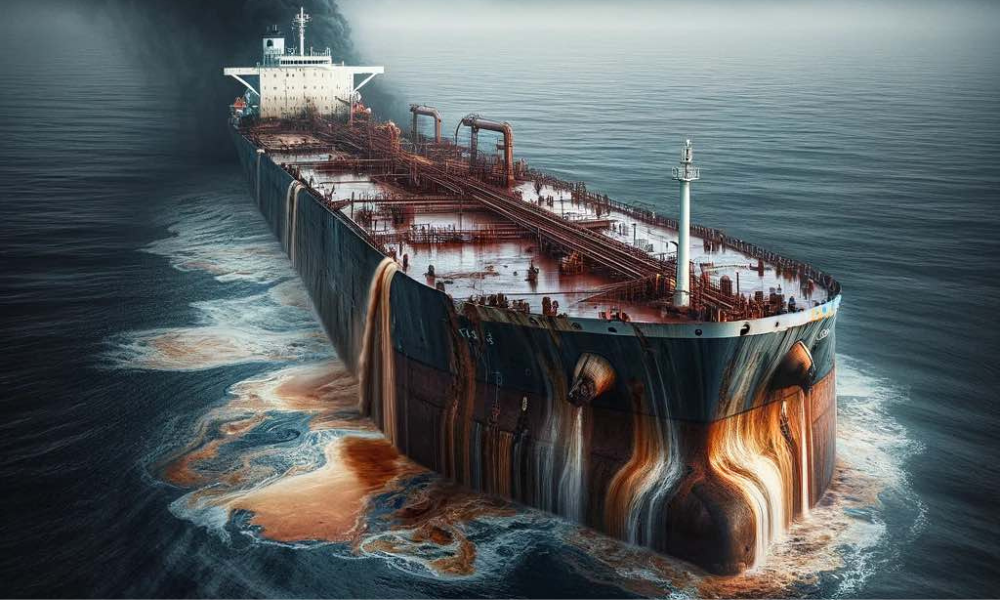Insurer part-owned company accused of offering worthless marine insurance

Russia’s ‘dark fleet’ is using worthless insurance to gain access to international ports says a new report by Danwatch and the Financial Times. Leaked documents have unveiled that Russian oil tankers are sidestepping Western sanctions by using insurance policies that are nearly impossible to claim against – showcasing the risky tactics of Moscow’s secret maritime operations.
This revelation, brought to light by the Financial Times and Danwatch, a Danish investigative journalism organization, indicates that numerous Russian vessels departing from the Baltic Sea are covered by insurance that could be voided in the event of disasters.
“More than a year after Russia’s invasion of Ukraine, the growth of the shadow oil tanker fleet is the latest consequence to challenge shipowners, their crew and insurers,” said Captain Rahul Khanna, global head of marine risk consulting at Allianz’s AGCS.
Ingosstrakh, based in Moscow and providing essential insurance for ships to enter global ports, includes a “sanctions exclusion clause” in its agreements. This clause renders most insurance claims related to the transport of Russian oil ineffective.
The secretive arrangements between Russia’s hidden fleet and Ingosstrakh create substantial financial risks for coastal countries in Europe and Asia, potentially leaving them with hefty bills for oil spill cleanups.
Michelle Wiese Bockmann, an analyst at Lloyd’s List, has expressed serious concerns over the environmental and safety threats at critical shipping routes frequented by Russian oil tankers, such as the Danish waters and the English Channel. These are international waters that these vessels navigate daily. “Many of the vessels fly the flags of countries like Gabon and Cook Islands,” she said. “My cat could get insurance papers from those countries if it just presented some kind of insurance company to the maritime authorities in those countries. They don’t check anything.”
The G7’s pricing cap policy requires Western insurance companies and maritime businesses to avoid engaging with Russian oil sales priced above $60 per barrel.
In response, Russia has constructed a so-called “dark fleet”, concealing the ownership and management of these vessels through secretive practices, thereby enabling the sale of oil above the established price cap. Remarkably, more than 90% of Russian crude exported from the Baltic in December was sold at prices exceeding the cap, according to the Kyiv School of Economics.
The insurance provided by Ingosstrakh is vital for these dark fleet ships travelling through the waters of Denmark and the English Channel on their way to India. A specific contract clause demands adherence to the sanctions laws of the US, UK, and EU, including the price cap.
Ingosstrakh also maintains the right to cancel insurance for any ship caught selling oil above the price limit, aiming to sidestep “secondary sanctions and reputation damage.” This policy stance on refusing payouts for spills from vessels violating the price cap is consistent with practices of other international insurers, with Ingosstrakh emphasizing a zero-tolerance policy towards such infractions.
Lars Løkke Rasmussen, the Danish Foreign Minister, voiced his concerns to the FT regarding tankers dodging sanctions without adequate insurance and indicated Denmark’s willingness to support additional EU measures against Russia’s clandestine maritime fleet.
Ingosstrakh, with its origins as Chief Agency of Foreign Insurance of the USSR in the Soviet era, is the fourth largest Russian insurer, although maritime insurance constitutes a small portion of its business portfolio. A year ago, Generali quit Ingosstrakh’s board as it wound down its Europ Assistance operations in Russia. Generali still owns a 38.5% stake in the Russian insurer, “Since the start of the war in Ukraine, Generali has been closely monitoring the situation and implications for operations and financial markets,” a spokesman said at the time before withdrawing from the board. AM Best downgraded its rating of the insurer to B from B+ at the time.
Despite the freezing of Generali’s stake following the invasion, Ingosstrakh asserts it still engages in reinsurance activities with some non-Russian companies.
The ongoing debate regarding the dark fleet’s ability to financially handle large-scale oil spill incidents, similar to the Exxon Valdez or Braer disasters, grows as more vessels operate outside Western insurance coverage.
And the so-called “dark fleet” tends to consist of older vessels. “The shadow fleet is more likely to be made up of older ships, operating under flags of convenience with lower maintenance standards,” said Justus Heinrich, global product leader marine hull at Allianz’s AGCS unit.
In an incident last year where the UAE-managed Canis Power tanker, transporting Russian crude, encountered mechanical failures in the narrow Danish straits catapulted the issue to the front of the Danish public’s attention. An inspection later found the 18-year-old vessel had 11 faults, including issues with its emergency power system and firefighting equipment.
Allianz reports that there have been at least eight groundings, collisions or near misses involving tankers carrying sanctioned oil products, such as:





